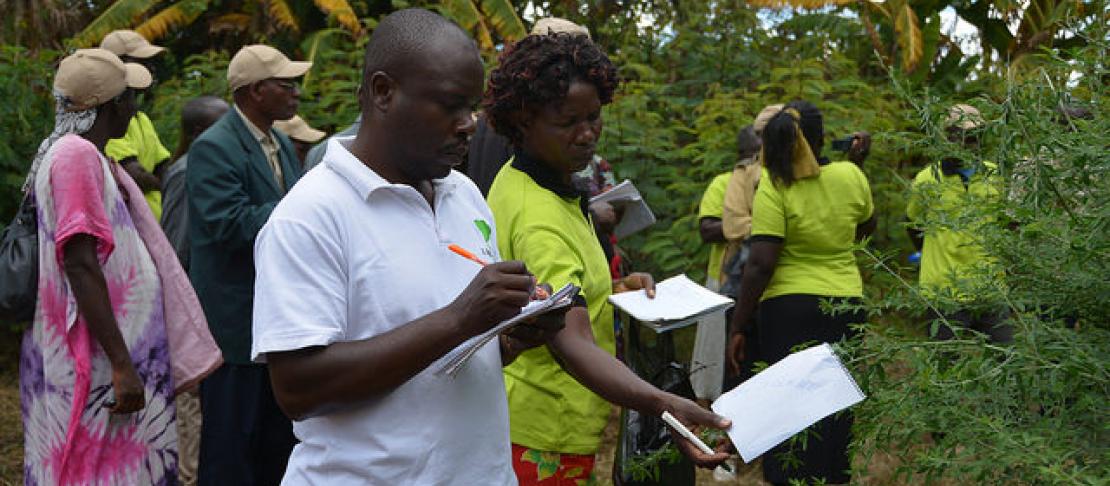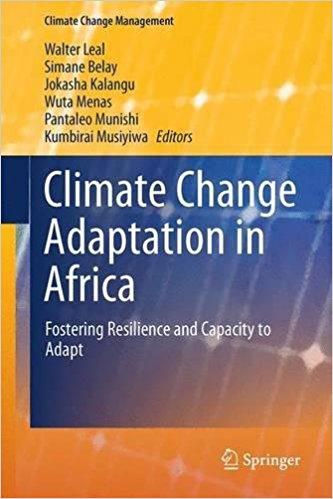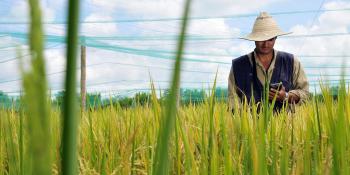Examples of good practices on climate change adaptation from Nyando shared to foster learning

Research in Nyando Climate-Smart Villages presented to foster exchange of experiences from climate change adaptation projects in Africa
Sustainably increasing agricultural productivity in Nyando is central to the future of food nutrition and security, and there is need for strategies to enhance climate-smart agriculture as the first step for sustainable agriculture. To address this challenge, the CGIAR Research Program on Climate Change, Agriculture and Food Security (CCAFS) East Africa, in collaboration with Kenyan research and development organisations, partnered with rural communities to develop Climate-Smart Villages (CSVs) as models of local actions that ensure food security, promote adaptation and build resilience to climatic stresses.
In February 2016, researchers from CCAFS East Africa presented emerging results from the Nyando CSVs at the Symposium on Climate Change Adaptation in Africa. The symposium was held to mobilise African and non-African scholars undertaking research on adaptation in Africa. The 3 articles focusing on gender and intersectionality, resilient crop interventions and the Farms of the Future (FoTF) approach were published recently in a book titled 'Climate Change Adaptation in Africa: Fostering Resilience and Capacity to Adapt’.
Uptake of climate-smart agriculture through a gendered intersectionality lens
Download the paper: Uptake of Climate-Smart Agriculture Through a Gendered Intersectionality Lens: Experiences from Western Kenya
The research used a gendered intersectionality lens to explore how factors such as age, ethnicity, education and marital status intersect with gender to influence the uptake of CSA technologies and practices. Intersectionality is a tool for studying, understanding and responding to the ways in which gender intersects (or interacts) with other identities and how these intersections contribute to unique experiences of oppression and privilege. The application of a gendered intersectionality lens reveals fundamental factors which influence the uptake of CSA interventions introduced by CCAFS and partners.
The study concludes that overall, farmers, regardless of gender, are willing to adopt climate-smart technologies and practices. Factors such as ethnicity, education, age and marital status determine the levels of uptake of CSA technologies and practices. These lessons can be used to inform the process of implementing CSA-related policies, programmes and projects in Kenya.
Uptake of resilient crop interventions to manage risks through the CSV approach
Download the paper: Uptake of Resilient Crop Interventions to Manage Risks Through Climate-Smart Villages Approach in Nyando, Western Kenya
The study used the household survey designed by CCAFS to develop simple, comparable household level indicators, for which changes can be evaluated with time. These indicators include food security, household assets, diversity in on-farm agricultural production, adaptation, and farming practices. The study found that Nyando farmers are increasingly using the terracing technique for collecting surface runoff water thus increasing infiltration and controlling water erosion, to help transform the landscape. The Nyando farmers have been incrementally practicing intercropping. This crop intervention spreads the risk of crop failure because the crops have different patterns of growth, and are affected by different pests and diseases. The food insecurity risk is reduced, and with sufficient rainfall could be a chance of getting higher yields from the two crops grown as an intercrop.
The study also found that households are diversifying crop choices to deal with climate-related risks. Early results show a shift to use of improved agronomic practices and high diversification. Households are now adopting more than three crops, greatly expanding on-farm choices for resilient varieties. However, there is need to have climate information services to guide farmers in decision making on crop types and varieties.
Strengthening farmer adaptive capacity through Farms of the Future approach
Download the paper: Strengthening Farmer Adaptive Capacity Through Farms of the Future Approach in Nyando, Western Kenya
In order to strengthen adaptive capacity and encourage transformative changes, farmers need to understand what their future climate is likely to be. Through the Farms of the Future approach, the CCAFS Climate Analogues tool can be used to connect farmers to their possible future climates through farmer-to-farmer learning exchanges. During an 8-day learning journey to several learning sites in Nyando, farmers and stakeholders were exposed to a wide range of ongoing community adaptation and risk management strategies and innovations, both institutional (collective action to manage climate risks such as community banks and establishment of tree nurseries) and technological (such as simple farm mechanization and animal feed establishment).
One of the lessons emerging from the learning journey is that farmers need space to explore future horizons and potential challenges and opportunities, and can effectively learn from their peers. This learning is not necessarily about technology transfer, but also about institutional change and developing localized solutions. It is critically important to engage actors from across the agricultural sector, because of the uncertainties posed by climate change, the need for more flexibility in responses (e.g. from agricultural advisors) and the potential scale of the challenges ahead.
We are proud that these research papers are available in a book to serve the purpose of showcasing experiences from research, field projects and best practices in climate change adaptation in African countries, which may be useful or implemented in other countries in the continent.
Download the papers:
The papers are avalable in Climate Change Adaptation in Africa: Fostering Resilience and Capacity to Adapt

Mungai C, Opondo M, Outa G, Nelson V, Nyasimi M, Kimeli P. 2017. Uptake of Climate-Smart Agriculture Through a Gendered Intersectionality Lens: Experiences from Western Kenya. In: Filho WL et al (eds.). 2017. Climate Change Adaptation in Africa: Fostering Resilience and Capacity to Adapt. Part II. Cham, Switzerland: Springer International Publishing. pp 587-601.
Recha JW, Radeny M, Kinyangi J, Kimeli P. 2017. Uptake of Resilient Crop Interventions to Manage Risks Through Climate-Smart Villages Approach in Nyando, Western Kenya. In: Filho WL et al (eds.). 2017. Climate Change Adaptation in Africa: Fostering Resilience and Capacity to Adapt. Part II. Cham, Switzerland: Springer International Publishing. pp 531-538.
Kimeli P, Nyasimi M, Radeny M. 2017. Strengthening Farmer Adaptive Capacity Through Farms of the Future Approach in Nyando, Western Kenya. In: Filho WL et al (eds.). 2017. Climate Change Adaptation in Africa: Fostering Resilience and Capacity to Adapt. Part II. Cham, Switzerland: Springer International Publishing. pp 629-645.
Lili Szilagyi is the Communications Consultant for the CCAFS Program Management Unit (formerly known as Coordinating Unit) and CCAFS East Africa.



